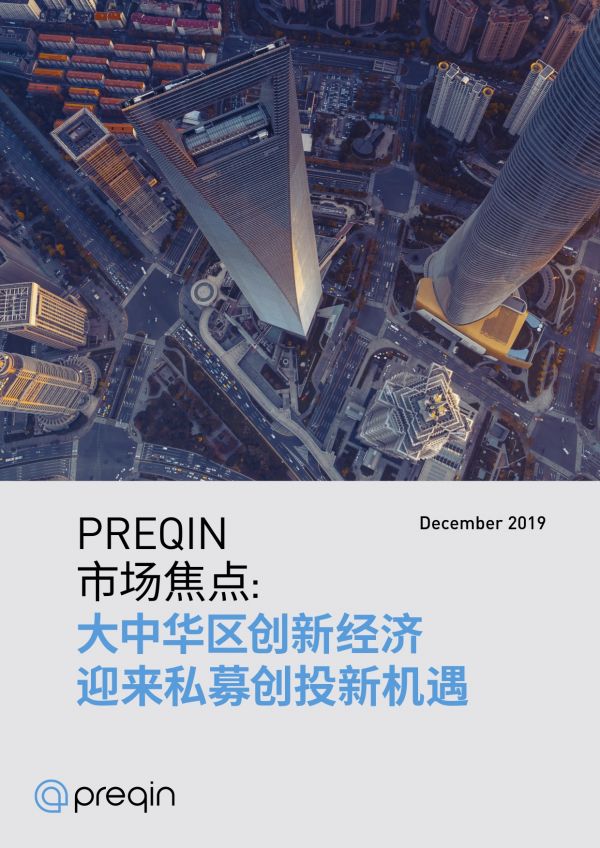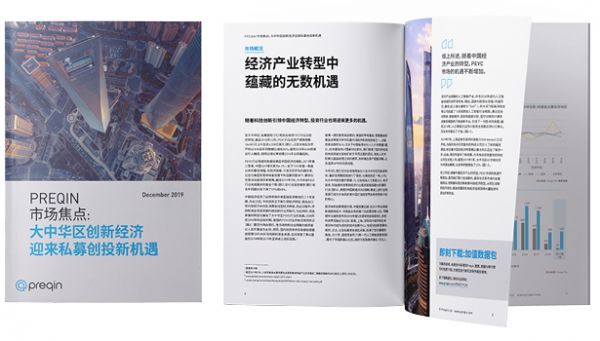美元LP对中国的两个关注点是什么?
编者按:Preqin是全球另类资产行业最权威的数据公司,为全球超过83,000家机构LP提供投资基金的数据服务和报告,是众多机构LP唯一使用的数据服务提供商。
Preqin此前尚未出版过针对中国的独立报告,今年应全球机构投资者增加在中国配置的请求,首次出版了中国区PE/VC 市场的旗舰大报告,并挑选了Prospect Avenue Capital (PAC) 作为中国唯一的基金参与了报告的编纂。PAC 共撰写了一篇中文和两篇英文文章。两周前,该报告已经推送给全球 8 万多机构投资者。
本文分中英文两个版本。第一部分是中文版,内容简洁。对应的英文版内容完整,有两篇文章。第一篇英文稿请查看第二部分。第二篇文章 Preqin 将在明年1月份单独出版,届时我们也即将转载。
本文来自Preqin,作者廖明,Prospect Avenue Capital (PAC) 的管理合伙人;原文摘录于《PREQIN市场焦点:大中华区创新经济迎来私募创投新机遇》,36氪经授权发布。

第一部分
IPO与破发齐飞
在估值过高的中国一级市场,拥有新颖商业模式的互联网公司广受私募股权与创业投资的追捧,其中一些公司也实现了IPO。但是,部分公司IPO后市值大幅下跌,表明资本市场对他们的商业模式和盈利预期都持有怀疑态度。
一、二级市场的估值倒挂,让参与中后期投资的PE机构损失严重。因此今年,投资机构的决策越发谨慎,他们质疑公司的估值和商业模式、延长了项目考察时间,并减少了投资标的数量。
目前,中国私募股权与创业投资人主要关注两点:高估值与复杂的监管环境。
投资价值不等于高估值
高估值是多种因素作用的综合体现。PAC认为,高估值包括如下原因:
供需错配:头部企业少,追捧的基金多,从而推高估值。
估值方法有误:很多公司被定位为互联网公司,估值 使用用户数量和GMV等指标,而不是所属行业的估值倍数;或是使用过高的估值指标,将国外成熟大型 公司的估值指标用在成立时间短、商业模式未经验证的创业企业上。
研究错位:投资机构的研究更多聚焦在行业及公司的潜力上。但很多公司的增长由投资推动,单位经济模型并不成立,即便规模增长,也始终无法实现盈利。
经验与常识缺乏:投资机构不能理解资本市场的信号,或即使有经验,也屈服于同行对高估值的追逐。
估值被人为推高:很多机构希望在一级市场获得的估值溢价被资本市场所接受,因此有动力推高估值。这个情况在前几年非常突出,中美都不例外。
只有估值高的公司才有投资价值吗?我们认为,投资价值并不一定代表高估值,而是商业模式被资本市场认可。
比如,在线教育公司跟谁学在IPO定价时使用了市盈率,目前市值低于几个未上市的同行。但跟谁学所使用的在线大班课,是在线教育行业迄今唯一的盈利模式,因此资本市场所给出的信号为:在线大班课、盈利、被资本市场接受、实现IPO。
又如小米90%的收入源于手机和硬件销售,在IPO前一直被定位成互联网公司,2014年的估值一度达到450亿美金。但公司目前市值270亿美金,表明资本市场只认可小米是硬件企业。
我们看到,资本市场理性、客观、简单,信号非常清晰。盈利是所有商业模式的实质。持续亏钱从来不是任何商业模式的核心。
资本市场对于高估值的质疑,即使在公司IPO后,也从来没有消失。如果说小米传递的信号还不够强,那么WeWork 最近取消IPO则标志着一个时代的结束。但是资本市场的信号往往被忽略了,其中可能的原因是:投资团队缺乏经验,无法感知信号。
PAC认为,IPO是PE基金唯一可行的退出路径,投资策略一定要坚持所投项目能够IPO,因此必须坚持资本市场为导向。只有商业模式被资本市场认可、有正确的定位、基于所属行业进行估值、单位经济模型成立、有持续盈利能力的公司,才是值得投资的标的,也才能有效抵御IPO后二级市场的波动。
主动拥抱监管
中国监管体系复杂,公司面临来自多部门的集体监管。投资机构如果拥有监管机构的资源和经验,并提供给被投企业,会对投资大有裨益。
只有深入了解监管体系,才能发挥关系的作用。理解体制、掌握机构历史沿革和人员变动,需要多年时间和经验的积累。因此,投资团队是否拥有监管经验和人脉资源非常重要。
以互联网企业为例:作为中国的互联网监管机构,网信办如中国人民银行、外汇管理局、中国证监会、中国银保监会、工信部和公安部等责日常监管和紧急事件的处理。若涉及公民隐私泄露或政治敏感,公司服务器有可能被关闭。若情节重大,创始人则可能被公安机关逮捕。
监管最近对大数据公司与公民个人隐私泄露的整顿,直接影响了多家企业。根据公开报道,2018 年年底五家大数据公司的创始人被逮捕。另外,2019年8月,外汇管理局对两家跨境支付公司做出通报,并要求银行和其他支付公司停止和他们的合作,这势必会对他们的业务产生重大影响。上述公司的投资者中不乏知名基金。
全世界每个国家的监管,都存在滞后,并担心新事物。因此我们的态度是:创业公司要主动拥抱监管。
投资机构应主动对接具体的监管机构,帮助公司加深对监管机构的了解,从而减少监管的不确定性,并鼓励公司经常主动和监管机构保持沟通,消除监管对新业务的担心,保证业务的合法合规。
未来市场方向
我们认为,投资项目执行时间的延长,在客观上会造成投资项目数量的减少。但鉴于基金的弹药仍然很多,且很多基金没有完全意识到市场信号,因此数量不会下降过多。
目前,估值已经出现下滑,但并未在私募股权与创业投资全行业得到充分贯彻实施。一些机构的自我教育有限,且依然对资本市场为高估值买单抱有幻想,因此对于估值下滑的幅度,我们表示存疑。虽然WeWork取消IPO是一个历史性事件,但考虑到地理距离,只有若干类似案例发生在中国之后,全行业才能对估值进行充分全面反思。
总体而言,在估值方面,投资机构需要认清投资价值不等于高估值,并要坚持以资本市场为导向,挑选即使在IPO后依然能抵御市场波动的持续盈利的公司。在监管方面,投资机构需要为被投企业对接相关监管部门,鼓励企业主动拥抱监管。投资机构共同努力,才能让中国未来的投资市场变得更好。
第二部分:英文原版
《Understanding China’s Complex Regulatory System Is Vital for PEVC Investors》
Personal connections or ‘guanxi’ isn’t enough – PEVC investors targeting China’s internet businesses also need to know how its regulatory agencies function
China has an extensive and complex regulatory framework. Start-ups and small businesses operating in China’s fast-growing internet sector need to be able to navigate this system. Many of these businesses have yet to familiarize themselves with the agencies regulating them, and often they look to their private equity or venture capital (PEVC) backers to bolster this competency.
That’s why it’s vital that PEVC investors possess the necessary ‘guanxi’ or personal relationships with regulatory agencies. However, personal relationships alone aren’t enough. PEVC investors also need to have a deep understanding of China’s regulatory system. This means having a strong grasp of the historical evolution of the relevant regulatory agencies, along with up-to-date knowledge of key personnel changes.
These are essential elements for PEVC investors to build a track record of success. PEVC investment teams must be able to show that they have the experience and the contacts to help their investee companies resolve potential conflicts with regulators before they escalate. The first step is knowing the roles and responsibilities of the many government institutions operating in this space.
Compliance Failures Can Have Serious Consequences
The Cyberspace Administration of China (CAC)1 is one of the leading internet regulators in China. The
CAC works with several ministries and agencies that are responsible for routine supervision of internet businesses, including the People's Bank of China, the State Administration of Foreign Exchange (SAFE)2, the China Securities Regulatory Commission (CSRC)3, the China Banking and Insurance Regulatory Commission (CBIRC)4, the Ministry of Industry and Information Technology (MIIT)5, the State Administration for Market Regulation (SAMR)6 and the Ministry of Public Security (MPS)7.
We have noticed that government tolerance of the illegal collection and usage of consumer information through mobile apps is gradually wearing thin.
According to publicly availabIe information, in January 2019, the CAC, together with the MIIT, MPS and SAMR, announced a joint decision to crack down on the illegal collection of personal information. Shortly after the announcement, Personal Information Protection Taskforce on Apps was established by the National Information Security Standardization Technical Committee(8), China Consumers Association(9), Internet Society of China(10) and CAC to be responsible for supervising the collection of mobile app information.
In November 2019, the MIIT announced a special remediation act to protect app users, focusing on the illegal collection and usage of consumers’ information as well as unreasonable demands on user limits, which affected numerous apps and app stores. More than 140 apps were reviewed and 20 of them were summoned to meet regulators.
There are also cross-agency groups like China’s Internet Financial Risk Specialist Rectification Work Leadership Team, which was established in October 2016 and is led by the central bank. Members of the Team include the CSRC, the CBIRC, the MIIT and the SAMR. The Team’s supervision spans online credit platforms (including peer-to-peer lending and cash loans), online payments, online fund sales, online asset managers, internet brokerages, online insurance brokerages, and digital currency and exchange.
Failure to understand and comply with China’s internet regulations can have serious consequences. Two recent cases highlight the importance of knowing how to work with regulators to ensure compliance. The first occurred in late 2018, when local public security bureaus working with the MPS arrested the founders of five big data companies for violations involving the disclosure of Chinese citizens’ private information.
The second occurred in August 2019, when SAFE notified two cross-border payment companies that they had failed to comply with existing regulations. SAFE ordered banks and other payment companies to stop cooperating with these companies, essentially putting a stop to their business.
How PEVC Investors Can Help
Educating investee companies about the importance of regulation and connecting them with specific agencies to deepen mutual understanding is critical. PEVC investors must also encourage investee companies to provide these agencies with regular updates about how their business is progressing. These updates can help to eliminate regulatory concerns.
In emergency situations, PEVC investors must be able to take quick action. This may involve contacting the head of the specific department responsible for regulating an investee company in order to facilitate communication, explain the situation, clear up any misunderstandings and avoid potential business suspensions.
Tech companies across the globe are facing increasing scrutiny from governments, and in China heavier regulation is on the horizon. By leveraging decades of experience working with various Chinese regulatory authorities, and our extensive capital markets expertise, PAC is able to help investee companiesto identify and avoid potential regulatory pitfallswith foresight. Learning this proactive approach to regulation gives our investee companies a competitive edge, and adds value for our limited partners.
1 http://www.cac.gov.cn/
2 http://www.safe.gov.cn/en/
3 http://www.csrc.gov.cn/pub/csrc_en/
4 http://www.cbirc.gov.cn/web2019/english/index.html
5 http://www.miit.gov.cn/
6 http://www.samr.gov.cn/
7 http://www.mps.gov.cn/
8 https://www.tc260.org.cn/
9 http://www.cca.cn/En/Index.html
10 http://www.isc.org.cn/english/
Prospect Avenue Capital (PAC)成立于2018年,总规模五亿美金,专注投资中后期的中国互联网企业。目前投资八个项目, 接近两亿美金,其中的五个中后期项目预计全部实现IPO。
创始人廖明毕业于普林斯顿大学,曾经就职于摩根士丹利、凯雷和瑞银集团。

本文摘录至《PREQIN市场焦点:大中华区创新经济迎来私募创投新机遇》,更多优质的内容与PEVC行业趋势,请于此参见Preqin报告全文。报告中,我们探讨近期大中华区PEVC趋势、热门行业趋势,并针对全球活跃于大中华区的投资者进行了LP意向调查与圆桌访谈,了解投资者未来12个月内的投资意向、配置目标与收益期望。
Preqin 总部位于伦敦,是全球另类资产行业最权威的数据公司,为全球超过 85,000家机构投资者提供投资 PE/VC/hedgefund/房地产等另类资产的数据服务,基本上是 全球所有 LP 使用的唯一的另类数据公司。
© Preqin Ltd. www.preqin.com 25
相关推荐
美元LP对中国的两个关注点是什么?
我的美元LP,泡汤了
美元LP看重,巴菲特反对,它在中国开始流行了
大寒之年,LP如何选GP?中国的母基金该如何突围?|2019中国基金合伙人未来峰会
中国LP在哪里:各类市场化LP的运作现状及特点
中国 LP 在哪里(下)
LP 全景解读:基金如何找到合适的 LP?(上)
对话小村资本郑赞表:聚焦产业与克制规模,这些对母基金和VC同样适用丨LP怎么看
中小GP的隐忧:沦为LP的投资通道
重磅!36氪联合50家LP,“中国最受LP认可投资机构”暨“中国黑马基金10强”榜单发布
网址: 美元LP对中国的两个关注点是什么? http://m.xishuta.com/zhidaoview5747.html